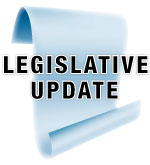 In a rare summer voting session on Thursday, July 23, the Senate gave final legislative approval to a measure intended to provide a new career ladder for New Jersey’s educators who choose to remain in the classroom rather than moving into an administrative or supervisory role. S-165/A-448 would establish a “teacher leader endorsement” that would be attached to the instructional certificate and available to a teacher who completes a program of study with a New Jersey Department of Education (NJDOE)-approved provider (e.g. institution of higher education, educational organization, or other non-profit entity). The bill creates an 11-member Teacher Leader Endorsement Advisory Board that will make recommendations to the NJDOE and the State Board of Education regarding the eligibility requirements and the program of study necessary for the endorsement. In addition, the advisory board must make recommendations to the State Board regarding non-supervisory roles and responsibilities for which the endorsement should be required. The 11-member advisory board would include one individual appointed upon the recommendation of the NJSBA as well as representatives of the NJEA, the American Federation of Teachers-New Jersey, the NJ Principals and Supervisors Association, the NJ Association of School Administrators, and NJ Association of Colleges for Teacher Education.
In a rare summer voting session on Thursday, July 23, the Senate gave final legislative approval to a measure intended to provide a new career ladder for New Jersey’s educators who choose to remain in the classroom rather than moving into an administrative or supervisory role. S-165/A-448 would establish a “teacher leader endorsement” that would be attached to the instructional certificate and available to a teacher who completes a program of study with a New Jersey Department of Education (NJDOE)-approved provider (e.g. institution of higher education, educational organization, or other non-profit entity). The bill creates an 11-member Teacher Leader Endorsement Advisory Board that will make recommendations to the NJDOE and the State Board of Education regarding the eligibility requirements and the program of study necessary for the endorsement. In addition, the advisory board must make recommendations to the State Board regarding non-supervisory roles and responsibilities for which the endorsement should be required. The 11-member advisory board would include one individual appointed upon the recommendation of the NJSBA as well as representatives of the NJEA, the American Federation of Teachers-New Jersey, the NJ Principals and Supervisors Association, the NJ Association of School Administrators, and NJ Association of Colleges for Teacher Education.
The bill was unanimously approved by both houses of the Legislature and now heads to the governor’s desk for his consideration. If approved, the bill would go into effect 90 days following enactment.
Assessment Resolution The Senate also adopted a non-binding resolution, SR-137, that urges the commissioner of education to develop guidelines by Sept. 1, 2015 that identify a range of appropriate policies that may be adopted by a school district when considering how students not participating in the statewide assessment will be supervised and what, if any, alternate arrangements will be provided for them during the test administration. Under the resolution, the guidelines should prohibit a school district from taking punitive action against a student including, but not limited to, the adoption of a “sit and stare” policy in response to the student’s refusal to participate in the statewide assessment. The guidelines should also address how and when the district’s policy will be communicated to parents, students, and school district staff.
The Senate passed a nearly identical resolution, SR-129, in late June. However, that resolution inadvertently included an incorrect date – Sept. 1, 2016 – by which the Senate would like the commissioner of education to adopt guidelines regarding non-participation in statewide assessments. SR-137 requests that such guidelines be put in place in time for the beginning of the next school year. As the resolution is non-binding and does not carry the full force and effect of law, it does not require any gubernatorial action.